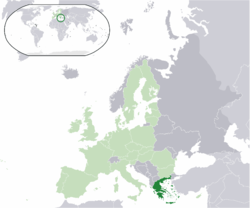Eurozone’s Stalled Talks Leave Greece In Limbo
By SETimes
By Andy Dabilis
A rift between IMF Managing Director Christine Lagarde and Eurozone finance ministers over whether to grant Greece a two-year extension to meet fiscal targets has delayed release of a 31.1 billion euro loan installment as Prime Minister Antonis Samaras said the country is running out of cash fast.
After talks broke down in Brussels following a 12-hour meeting Thursday (November 21st), Samaras, who had pushed through parliament a wildly-unpopular 13.5 billion euro spending cut and tax hike plan ordered by international lenders, complained Greece had kept up its end of the bargain.

“Greece did what it had committed it would do. Our partners, together with the IMF, also have to do what they have taken on to do,” Samaras said. “Any technical difficulties in finding a solution do not justify any negligence or delays.”
He added, “It is not just Greece but the whole of the Eurozone that depends on our partners’ decisions.”
Samaras canceled a planned trip to Qatar to woo investors so that he could be at the resumption of talks between the Eurozone and Lagarde on November 26th.
“It’s very disappointing, irrelevant of whether they can reach a decision next week,” Aggelos Tsakanikas, head of research for the Athens-based Foundation for Economic and Industrial Research, told SETimes.
“Now the critical voices will say Europe doesn’t want us, they won’t give us money or support us,” he said. “There is no excuse,” he said of the indecision. “We did everything they asked of us.”
The EU-IMF-ECB Troika put up 109 billion euros in 2010 in a first series of rescue loans but has held off on the first installment of a pending second bailout of 130 billion euros until Samaras got approval from the parliament for more austerity measures and other lagging reforms.
Major opposition party Coalition of the Radical Left (SYRIZA) leader Alexis Tsipras, who has vehemently opposed the austerity measures, said that Samaras and the Eurozone had failed.
“Disbursement of the next loan will not secure the sustainability of Greek debt,” said Tsipras, who added that the Eurogroup had even considered a repayment freeze.
But Antonis Klapsis, head of research for the Konstandinos Karamanlis Institute of Democracy, the think tank for Samaras’ New Democracy Conservatives, said critics were overreacting.
“Greece will receive the money by the beginning of December and this will boost the Greek economy and increase the flow of cash,” he told SETimes.
“It will be a huge success for the government which has faced huge problems and show the sacrifices made by the Greek people gave results,” he added.
The Troika said the harsh conditions are imperative for Greece to reduce its debt-to-GDP ratio to 120 percent by 2020 from the current 180 percent. Samaras asked for two more years to do that, but the delay could require as much as 31 billion euros to fill a financial gap and Lagarde said she doesn’t want Greece to pile on more debt.
Besides the funding, the Troika is trying to find ways to deal with the sustainability of its debt relief program so that the loans aren’t wasted. The other 16 countries in the Eurozone also must approve of release of more monies.
Nick Economides, professor of economics at the Stern School of Business at NYU and a visiting professor at the University of California-Berkeley, said Greece’s lenders are worried about whether bailouts alone can save Greece and are deciding the country’s future on their own.
“Once again, the future of Greek debt and Greece is decided with Greece absent,” he told SETimes.
